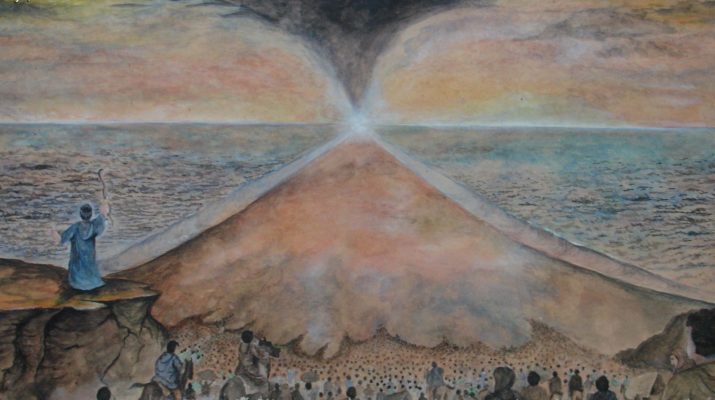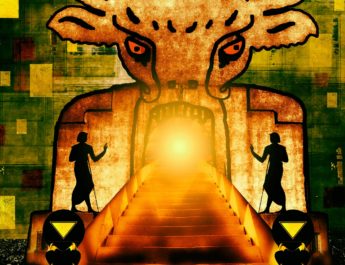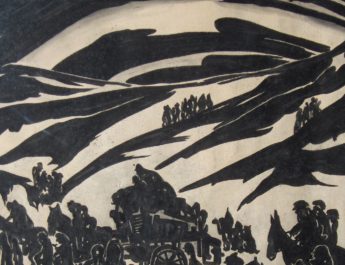Psalm 66:1-5
Narrative Lectionary 420
To the leader.I A Song. A Psalm.II
1 Make a joyful noiseIII to God,IV all the earth;V
I “leader” = natsach. Properly, something that glitters from a distance. So, something that stands out, excels, has status/standing (such as a chief musician or superintendent of Temple services). This can also mean to be permanent or enduring.
II “Psalm” = mizmor. From zamar (making music; used specially of music to worship God; music with singing, singing praise, singing psalms); may be from zamar (to trim or prune). This is a melody or a psalm.
III “make a joyful noise” = rua. To break or destroy something so figuratively, an ear splitting sound such as a call of alarm or a joyful sound.
IV “God” = Elohim.
V “earth” = erets. Root may mean to be firm. This is earth, ground, field land, or country.
2 singVI the gloryVII of his name;VIII
giveIX to him gloriousX praise.XI
VI “sing” = zamar. Related to “psalm” in superscript. See note II above.
VII “glory” = kabod. From kabad (to be heavy, weighty, burdensome). This is weighty. Figuratively, glorious, abundant, riches, honor, splendor – a reference to one’s reputation or character. This word is often used to describe God and God’s presence.
VIII “name” = shem. May be from sum (to put, place, set). This is name, fame, renown. A name was thought to indicate something essential about a person – something about their individuality. So, this word can also mean honor, authority, or character.
IX “give” = sum. Related to “name” in v2. See note VIII above.
X “glorious” = kabod. Same as “glory” in v2. See note VII above.
XI “praise” = tehillah. From halal (to praise, be boastful). This is praise or a song of praise. It is to offer God a hymn, to boast in God. This shares a root with “hallelujah.”
3 Say to God, “How awesome areXII your deeds!XIII
Because of your greatXIV power,XV your enemiesXVI cringeXVII before you.
XII “awesome are” = yare. This is to fear, be afraid, dreadful. It can also refer to fearful reverence – to fear in a moral sense is to say to revere, respect.
XIII “deeds” = maaseh. From asah (to do, make, accomplish, become). This is a word – any action whether positive or negative. It can also be a transaction, construction, activity, property, or something that is produced.
XIV “great” = rob. From rabab (to be or become much or many, multiply). This is any kind of abundance.
XV “power” = oz. From azaz (to be strong, become fixed, be bold, prevail, be impudent; it means to be stout literally or figuratively. A Late Hebrew word). This is strength in the sense of force, majesty, praise, material and physical strength, the abstract notion of security. It can also speak of social or political power.
XVI “enemies” = oyeb. From ayab (to hate or be hostile to). This is a foe or enemy as one that you are hostile to.
XVII “cringe” = kachash. This is deceive, fail, or deny. It can be lying or disappointing. It can also mean becoming lean or cringe.
4 All the earth worshipsXVIII you;
they sing praisesXIX to you,
sing praises to your name.” SelahXX
XVIII “worships” = shachah. This is to bow down, make a humble entreaty, to do homage to royalty or to God.
XIX “sing praises” = zamar. Same as “sing” in v2. See note VI above.
XX “Selah” = selah. From salal (to lift up, build, pile, extol, exalt; can also be used for opposing as a dam holds back water). This is to lift up or exalt. Also, “selah” in the psalms where its precise meaning is uncertain. It could be a pause in the music, a moment of silence. It could signal a change in the service or mean something akin to amen.
5 ComeXXI and seeXXII what God has done:XXIII
XXI “come” = halak. This is go, come, walk. It is walk literally and figuratively and includes people and animals. It can be used figuratively for one’s moral life – how we walk according to God’s way or against it. It can also refer to the walk of life as in the course one’s life takes, the choices we make, etc.
XXII “see” = raah. This is to see in a literal or figurative sense so stare, advise, think, view.
XXIII “what…has done” = miph’al. 3x in OT. From pa’al (to do, make, work, or accomplish; generally refers to regularly repeated or systematic action – to practice). This is work, deed, something manufactured, thing.
he is awesomeXXIV in his deedsXXV among mortals.XXVI
XXIV “is awesome” = yare. Same as “awesome are” in v3. See note XII above.
XXV “deeds” = alilah. From alal (to affect, do, practice, mock, overdo, glean, abuse, pain). This is a deed or action – something that causes an effect. It could be a wanton or shameful deed or an opportunity.
XXVI “mortals” = ben + adam. Literally “children of humanity.” Ben is from banah (to build or obtain children). This is son, age, child. It is son in a literal or figurative sense. Adam is perhaps from adam (to be red, make ruddy); related to adamah (ground, dirt, earth). This is man, humankind, also Adam’s name. It refers to a human individual or humanity.
Image credit: “A Scene from Exodus – Moses separating the red sea to free Israelites from bondage of Egyptians” by Ramesh Raju, 1997.




